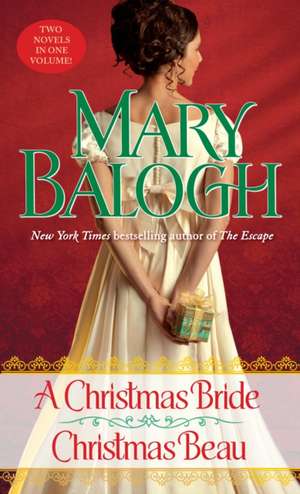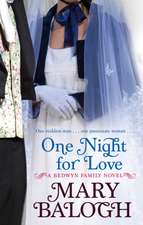A Christmas Bride/Christmas Beau
Autor Mary Baloghen Limba Engleză Paperback – 26 noi 2012
A CHRISTMAS BRIDE
The very wealthy Edgar Downes has promised his aging father to finally take a bride—specifically, to wed a titled lady by Christmas. London is full of pretty, proper, and eligible misses, but it’s the widow Helena, Lady Stapleton, in a shocking red dress, who captures Edgar’s attention. Helena is intrigued by the seductive stranger—but he’s simply not in her class. Marriage, of course, would never do. But in a season of miracles, something wondrous is about to happen.
CHRISTMAS BEAU
Not even the warm, forgiving Christmas spirit can stop the Marquess of Denbigh from settling his score with Judith Easton: The beautiful young widow injured Denbigh’s pride years ago by jilting him for another man. Now that Judith is free from a nightmare marriage, the handsome marquess has her in his sights—and wants her in his arms. But to trust the tender words on his lips, Judith must not only see past the hardness of his heart, but learn once again to trust her own heart’s desire.
Preț: 56.82 lei
Nou
Puncte Express: 85
Preț estimativ în valută:
10.87€ • 11.37$ • 9.03£
10.87€ • 11.37$ • 9.03£
Carte disponibilă
Livrare economică 13-27 martie
Preluare comenzi: 021 569.72.76
Specificații
ISBN-13: 9780440245469
ISBN-10: 044024546X
Pagini: 511
Dimensiuni: 117 x 188 x 29 mm
Greutate: 0.25 kg
Editura: Dell Publishing Company
ISBN-10: 044024546X
Pagini: 511
Dimensiuni: 117 x 188 x 29 mm
Greutate: 0.25 kg
Editura: Dell Publishing Company
Notă biografică
Mary Balogh is the New York Times bestselling author of numerous books, including the acclaimed Slightly and Simply novels, the Mistress novels, and the five titles in her Huxtable series: First Comes Marriage, Then Comes Seduction, At Last Comes Love, Seducing an Angel, and A Secret Affair. A former teacher, she grew up in Wales and now lives in Canada.
Extras
1
Mr. Edgar Downes had decided to take a bride.
Doubtless he should have made up his mind to do so long before he did, since he was six-and-thirty years old and had both a high respect for matrimony and a fondness for family life. But the truth was that he had procrastinated. He had felt caught between two worlds. He was not a gentleman. He was the son of a Bristol merchant who had grown enormously wealthy over the years and had eventually purchased and renovated a grand mansion and estate near Bristol and retired to live there like a gentleman. Edgar had been educated at the best schools, had become a respected and successful lawyer, and then had taken over his father’s business.
He was hugely wealthy in his own right. He had received a gentleman’s education. He spoke and dressed as a gentleman. He would inherit Mobley Abbey on his father’s death. He was extremely eligible. But he was not a gentleman by birth, and in certain circles that fact made all the difference in the world.
He had thought about marrying someone of his own kind. At various points during his adulthood he had even singled out a few daughters or sisters of his middle-class acquaintances as possible wives. But he had never felt that he quite belonged in their world--not when it came to something as personal and intimate as marriage. He would have been hard put to it to explain exactly why that was so. There were certain almost puritanical attitudes in the class, perhaps, or a certain vulgar preoccupation with money and possessions for their own sake. Though neither explanation quite accounted for his discomfort.
He had thought of marrying a lady. But there had been obvious arguments against that. And they all narrowed down to one simple fact--he was not a gentleman. It was true that Cora, his sister and only sibling, had married a younger son of a duke seven years before and had become Lady Francis Kneller as a result. It was true, too, that Edgar got along remarkably well with his exceedingly elegant brother-in-law and with those of their aristocratic friends he had met. But though Cora’s marriage appeared to be bowling along very nicely indeed and had produced four bouncing children, Lord Francis would not in the normal course of events have wed her. It was her disastrous tendency to play heroine without pausing for one hundredth part of a second to consider the wisdom of her actions that had forced him on more than one occasion to her rescue and to compromising circumstances at the same time. Finally, poor fellow, he had had no choice--as a gentleman--but to take on a leg shackle and Cora all at the same time.
Lord Francis Kneller and his friends--the Earl of Thornhill, for example, or the Marquess of Carew or the Duke of Bridgwater--might be quite prepared to treat Mr. Edgar Downes, Lady Francis’s brother, as a friendly acquaintance. But would they be happy to watch him woo and wed their sisters or cousins if he so chose, and if there were any such females available? It was a question Edgar could not answer with any certainty since he had never posed it to any of the gentlemen concerned, but he could make an educated guess.
Some lesser gentleman with a daughter difficult to fire off in a more acceptable manner--due to impoverishment or lack of beauty or a shrewish nature, perhaps--might be very willing to ally her to a cit, to a lawyer-turned-merchant who also happened to be as wealthy as all but a few of the bluest-blooded lords in the land and with as much more wealth again to inherit on the death of his father. That lesser gentleman, however, would believe in his heart--and all the genteel world would believe with him--that he had stooped low indeed for the mere satisfaction of seeing his daughter wed.
But at the age of six-and-thirty Edgar Downes had decided to take a bride. A bride of good birth. A lady, no less. And he was going to do it soon. By Christmastime he would either be betrothed or have fixed his choice firmly and confidently enough that he would invite the woman and her family to Mobley Abbey for the holiday and a celebration of the betrothal. It was a promise he had made his father, and he always kept his promises.
The elder Mr. Downes celebrated his sixtieth birthday at the beginning of September. And though it would be difficult to find a healthier, more robust, more mentally agile man of his age anywhere in the kingdom, he had chosen on that occasion to remember his mortality and to declare himself an old man. An old man with a dying wish. Cora had shrieked when he had put it thus, doubtless imagining all sorts of hidden and deadly ailments, and Lord Francis had pursed his lips. Edgar had rocked back on his chair. The dying wish was to see his son wed. Perhaps he would even be spared long enough to see a son of his son in the nursery . . . a man longed for an heir to his heir.
And since Mr. Downes had achieved almost every goal that any man could possibly set himself in the course of his lifetime--including a lamentably short but blissfully happy marriage, the birth and survival of the best son and daughter a man ever had, not to mention a challenging and successful career and the acquisition of the abbey--he had only one more thing to wish for, apart from the marriage of his son, of course, and that was the birth of a son to his son. He could wish that his son would marry well, that he would finally ally the Downes name to one of undoubted gentility.
“You are a gentleman, my son,” he said, nodding his head in Edgar’s direction, his eyes beaming with pride and affection. “Your dear mother was a lady in every sense that mattered to me. But for my son I want a lady by birth. You have deserved such a wife.”
Edgar felt embarrassed, especially since these words had been spoken in the presence of Lord Francis Kneller. He also felt suspiciously damp-eyed. His father meant more to him than almost anyone else in this world.
“And it is high time you married, Edgar,” Cora said. “It is all very well for the children to have an uncle who spoils them dreadfully every time he crosses paths with them, but cousins would be of more practical value to them. And an aunt.”
Lord Francis chuckled. “You must confess, Edgar,” he said, “you have had a good run of it. You are six-and-thirty and only now is your family laying siege to your single state.”
“That is quite unfair, Francis,” Cora said. “You know that every time Edgar has come to Sidley since our marriage I have thrown the most eligible young ladies in his way. You know that I have tried my very best.”
Lord Francis chuckled again. “You are as successful as a matchmaker, my love,” he said, “as you are at your swimming lessons.”
“Well,” she said crossly, “whoever says that the human person--my human person anyway--is not heavier than water and will not sink like a stone when laid out on top of it must have windmills in his head and that is all I have to say.”
“For which mercy may the Lord be praised,” Edgar said, provoking outright laughter from his brother-in-law and a glare followed by a rueful chuckle from his sister.
But his father was not to be diverted from what he had clearly planned as the mission of his sixtieth birthday. Edgar was to marry and to marry a lady. A duke’s daughter could not be too good for his son, he remarked.
“What a pity it is that Francis’s sisters are married,” Cora commented. “Is it not, Francis?”
“Quite so, my love,” he agreed.
But any lady of breeding would do nicely, Mr. Downes continued after the interruption. Provided Edgar could like and respect her--and feel an affection for her. That, it seemed, was of greater importance than almost anything else.
“She does not have to be a lady of fortune, my boy,” Mr. Downes said. “She can come to you penniless, provided she has the birth and breeding and can love you.”
A penniless lady of ton would probably love his money a great deal, Edgar thought cynically. But he could not argue with his father, who looked as if he would live until the age of one hundred with all his energies and faculties intact, but who was, when all was said and done, sixty and aging. It was understandable that his father should need the assurance that all he had worked for through his life would descend to more than just an unmarried son.
And so Edgar found himself agreeing that it was indeed time he took it upon himself to find a bride and that if it would please his father he would choose one who had some distinction of birth. And there was nothing to be served by delaying, he suggested without waiting to be prompted by his father. He had some business in London, a city he hated and avoided whenever it was possible to do so. He had a few connections there who would effect some introductions. He would undertake to choose himself a bride, perhaps even to be affianced to her by Christmas. He would bring her down to Mobley Abbey for Christmas--or at least invite her parents to bring her. By his father’s sixty-first birthday he would be married and be in a fair way to getting his first child into the nursery.
Cora shrieked and clasped her hands to her bosom.
“You are conceiving an idea, my love?” Lord Francis asked, sounding amused. He was frequently amused, having decided long ago, it seemed, that it would be far more comfortable to laugh his way through life with Cora than to grimace his way through all her excesses and disasters. Wise man.
“Francis was not able to have his month in London during the Season this year,” she said. “First we were in the north with Jennifer and Gabriel and then we went with them to Stephanie and Alistair’s, and we were all having such a marvelous time and so were the children--were they not, Francis?--and Stephanie has the most adorable baby, Papa. He even had me dreaming of number five, but Francis insists in that most odious voice he uses when he wants to pretend to be lord and master that four is quite enough, thank you very much. What was it I set out to say?”
“That since I was not obliged to spend a month of the Season in town,” Lord Francis said, “I should be encouraged to take you and the children there for the autumn. I do believe that was where your verbal destination lay, my love.”
She favored him with a dazzling smile. “What a splendid idea, Francis,” she said. “Jennifer and Gabriel and Samantha and Hartley were talking about going there for a month or so after the heat of the summer was over. We could have a wonderful time. And we could take Edgar about with us and see to it that he meets the right people.”
“With all due respect, my love,” Lord Francis said, “I do not believe Edgar is a puppy who needs our patronage. But certainly we will give him the comfort of having some familiar faces to greet at whatever entertainments are to be found during the autumn. And you will stay with us if you please, Edgar. The Pulteney Hotel may close its doors and go into a permanent decline when they discover that they are not to have your business, but we can offer some rowdy nephews and a niece for your entertainment. Who could possibly resist?”
“Edgar will spoil them and make them quite unmanageable,” Cora said.
“Their maternal grandfather has spoiled them for the past two weeks as well as their uncle. We spoil them, my love,” her husband said. “Yet we manage them perfectly well when it is necessary that they be managed. Their rowdiness and exuberance do not denote lack of all manners and discipline.”
Between them they sealed Edgar’s fate. He was to go to town by the end of September, it seemed, and stay at his brother-in-law’s town house. He was to involve himself in the social life of the capital as it was lived in the autumn. There would not be all the balls and huge squeezes for which the spring Season was so renowned, but there would be enough people in residence in the grand houses of Mayfair to allow for a fair sprinkling of social entertainments. Lord Francis would see to it that Edgar was invited to a goodly number of them, and Cora would undertake to introduce him to some likely matrimonial prospects.
He needed their help. Despite the courteous tact of his brother-in-law’s words, Edgar felt no doubt about that. He might have managed it himself, but with far more effort than would be needed if he simply relied upon the fact that Francis was a member of the upper echelons of the ton. Edgar was resigned to forcing his way into ranks from which his birth would normally exclude him. He was prepared for some coolness, even some rejection. But he knew enough about the world to believe that his wealth and his prospects would open a number of doors to him, especially those of people who felt themselves in need of sharing in his wealth.
He did not doubt that it was within his power to win himself a bride by Christmas. Someone of birth and breeding. Someone who would not look upon his own origins with contempt or condescension. Someone pretty and personable. Someone of whom he could be fond, it was to be hoped. He came from a family that set much store by that elusive something called love. He loved his father and his sister and was loved by them in return. His parents had enjoyed a love match. So did Cora and Francis, though the marriage had not appeared too promising at the start. Edgar rather thought that he would like to make a love match, too, or at least a match of affection.
He had until Christmas. Three months.
He was going to choose himself a bride. He traveled up to London at the end of the month, a little chilled by the thought, a little exhilarated by it.
After all, he was enough his father’s son to find a challenge stimulating.
Lord Francis Kneller’s friends were indeed in London. The Earl and Countess of Thornhill and the Marquess and Marchioness of Carew had come down together from Yorkshire with their six children for the purpose of shopping and seeing the sights and socializing at a somewhat less frantic pace than the Season would have allowed. Even the Duke and Duchess of Bridgwater had come up with their new son, mainly because their other friends were to be there. The duke’s sister and Cora’s special friend, the Countess of Greenwald, was also in residence with her husband and family. And they all decided to be kind to Cora’s brother and to take him under their collective wing.
Mr. Edgar Downes had decided to take a bride.
Doubtless he should have made up his mind to do so long before he did, since he was six-and-thirty years old and had both a high respect for matrimony and a fondness for family life. But the truth was that he had procrastinated. He had felt caught between two worlds. He was not a gentleman. He was the son of a Bristol merchant who had grown enormously wealthy over the years and had eventually purchased and renovated a grand mansion and estate near Bristol and retired to live there like a gentleman. Edgar had been educated at the best schools, had become a respected and successful lawyer, and then had taken over his father’s business.
He was hugely wealthy in his own right. He had received a gentleman’s education. He spoke and dressed as a gentleman. He would inherit Mobley Abbey on his father’s death. He was extremely eligible. But he was not a gentleman by birth, and in certain circles that fact made all the difference in the world.
He had thought about marrying someone of his own kind. At various points during his adulthood he had even singled out a few daughters or sisters of his middle-class acquaintances as possible wives. But he had never felt that he quite belonged in their world--not when it came to something as personal and intimate as marriage. He would have been hard put to it to explain exactly why that was so. There were certain almost puritanical attitudes in the class, perhaps, or a certain vulgar preoccupation with money and possessions for their own sake. Though neither explanation quite accounted for his discomfort.
He had thought of marrying a lady. But there had been obvious arguments against that. And they all narrowed down to one simple fact--he was not a gentleman. It was true that Cora, his sister and only sibling, had married a younger son of a duke seven years before and had become Lady Francis Kneller as a result. It was true, too, that Edgar got along remarkably well with his exceedingly elegant brother-in-law and with those of their aristocratic friends he had met. But though Cora’s marriage appeared to be bowling along very nicely indeed and had produced four bouncing children, Lord Francis would not in the normal course of events have wed her. It was her disastrous tendency to play heroine without pausing for one hundredth part of a second to consider the wisdom of her actions that had forced him on more than one occasion to her rescue and to compromising circumstances at the same time. Finally, poor fellow, he had had no choice--as a gentleman--but to take on a leg shackle and Cora all at the same time.
Lord Francis Kneller and his friends--the Earl of Thornhill, for example, or the Marquess of Carew or the Duke of Bridgwater--might be quite prepared to treat Mr. Edgar Downes, Lady Francis’s brother, as a friendly acquaintance. But would they be happy to watch him woo and wed their sisters or cousins if he so chose, and if there were any such females available? It was a question Edgar could not answer with any certainty since he had never posed it to any of the gentlemen concerned, but he could make an educated guess.
Some lesser gentleman with a daughter difficult to fire off in a more acceptable manner--due to impoverishment or lack of beauty or a shrewish nature, perhaps--might be very willing to ally her to a cit, to a lawyer-turned-merchant who also happened to be as wealthy as all but a few of the bluest-blooded lords in the land and with as much more wealth again to inherit on the death of his father. That lesser gentleman, however, would believe in his heart--and all the genteel world would believe with him--that he had stooped low indeed for the mere satisfaction of seeing his daughter wed.
But at the age of six-and-thirty Edgar Downes had decided to take a bride. A bride of good birth. A lady, no less. And he was going to do it soon. By Christmastime he would either be betrothed or have fixed his choice firmly and confidently enough that he would invite the woman and her family to Mobley Abbey for the holiday and a celebration of the betrothal. It was a promise he had made his father, and he always kept his promises.
The elder Mr. Downes celebrated his sixtieth birthday at the beginning of September. And though it would be difficult to find a healthier, more robust, more mentally agile man of his age anywhere in the kingdom, he had chosen on that occasion to remember his mortality and to declare himself an old man. An old man with a dying wish. Cora had shrieked when he had put it thus, doubtless imagining all sorts of hidden and deadly ailments, and Lord Francis had pursed his lips. Edgar had rocked back on his chair. The dying wish was to see his son wed. Perhaps he would even be spared long enough to see a son of his son in the nursery . . . a man longed for an heir to his heir.
And since Mr. Downes had achieved almost every goal that any man could possibly set himself in the course of his lifetime--including a lamentably short but blissfully happy marriage, the birth and survival of the best son and daughter a man ever had, not to mention a challenging and successful career and the acquisition of the abbey--he had only one more thing to wish for, apart from the marriage of his son, of course, and that was the birth of a son to his son. He could wish that his son would marry well, that he would finally ally the Downes name to one of undoubted gentility.
“You are a gentleman, my son,” he said, nodding his head in Edgar’s direction, his eyes beaming with pride and affection. “Your dear mother was a lady in every sense that mattered to me. But for my son I want a lady by birth. You have deserved such a wife.”
Edgar felt embarrassed, especially since these words had been spoken in the presence of Lord Francis Kneller. He also felt suspiciously damp-eyed. His father meant more to him than almost anyone else in this world.
“And it is high time you married, Edgar,” Cora said. “It is all very well for the children to have an uncle who spoils them dreadfully every time he crosses paths with them, but cousins would be of more practical value to them. And an aunt.”
Lord Francis chuckled. “You must confess, Edgar,” he said, “you have had a good run of it. You are six-and-thirty and only now is your family laying siege to your single state.”
“That is quite unfair, Francis,” Cora said. “You know that every time Edgar has come to Sidley since our marriage I have thrown the most eligible young ladies in his way. You know that I have tried my very best.”
Lord Francis chuckled again. “You are as successful as a matchmaker, my love,” he said, “as you are at your swimming lessons.”
“Well,” she said crossly, “whoever says that the human person--my human person anyway--is not heavier than water and will not sink like a stone when laid out on top of it must have windmills in his head and that is all I have to say.”
“For which mercy may the Lord be praised,” Edgar said, provoking outright laughter from his brother-in-law and a glare followed by a rueful chuckle from his sister.
But his father was not to be diverted from what he had clearly planned as the mission of his sixtieth birthday. Edgar was to marry and to marry a lady. A duke’s daughter could not be too good for his son, he remarked.
“What a pity it is that Francis’s sisters are married,” Cora commented. “Is it not, Francis?”
“Quite so, my love,” he agreed.
But any lady of breeding would do nicely, Mr. Downes continued after the interruption. Provided Edgar could like and respect her--and feel an affection for her. That, it seemed, was of greater importance than almost anything else.
“She does not have to be a lady of fortune, my boy,” Mr. Downes said. “She can come to you penniless, provided she has the birth and breeding and can love you.”
A penniless lady of ton would probably love his money a great deal, Edgar thought cynically. But he could not argue with his father, who looked as if he would live until the age of one hundred with all his energies and faculties intact, but who was, when all was said and done, sixty and aging. It was understandable that his father should need the assurance that all he had worked for through his life would descend to more than just an unmarried son.
And so Edgar found himself agreeing that it was indeed time he took it upon himself to find a bride and that if it would please his father he would choose one who had some distinction of birth. And there was nothing to be served by delaying, he suggested without waiting to be prompted by his father. He had some business in London, a city he hated and avoided whenever it was possible to do so. He had a few connections there who would effect some introductions. He would undertake to choose himself a bride, perhaps even to be affianced to her by Christmas. He would bring her down to Mobley Abbey for Christmas--or at least invite her parents to bring her. By his father’s sixty-first birthday he would be married and be in a fair way to getting his first child into the nursery.
Cora shrieked and clasped her hands to her bosom.
“You are conceiving an idea, my love?” Lord Francis asked, sounding amused. He was frequently amused, having decided long ago, it seemed, that it would be far more comfortable to laugh his way through life with Cora than to grimace his way through all her excesses and disasters. Wise man.
“Francis was not able to have his month in London during the Season this year,” she said. “First we were in the north with Jennifer and Gabriel and then we went with them to Stephanie and Alistair’s, and we were all having such a marvelous time and so were the children--were they not, Francis?--and Stephanie has the most adorable baby, Papa. He even had me dreaming of number five, but Francis insists in that most odious voice he uses when he wants to pretend to be lord and master that four is quite enough, thank you very much. What was it I set out to say?”
“That since I was not obliged to spend a month of the Season in town,” Lord Francis said, “I should be encouraged to take you and the children there for the autumn. I do believe that was where your verbal destination lay, my love.”
She favored him with a dazzling smile. “What a splendid idea, Francis,” she said. “Jennifer and Gabriel and Samantha and Hartley were talking about going there for a month or so after the heat of the summer was over. We could have a wonderful time. And we could take Edgar about with us and see to it that he meets the right people.”
“With all due respect, my love,” Lord Francis said, “I do not believe Edgar is a puppy who needs our patronage. But certainly we will give him the comfort of having some familiar faces to greet at whatever entertainments are to be found during the autumn. And you will stay with us if you please, Edgar. The Pulteney Hotel may close its doors and go into a permanent decline when they discover that they are not to have your business, but we can offer some rowdy nephews and a niece for your entertainment. Who could possibly resist?”
“Edgar will spoil them and make them quite unmanageable,” Cora said.
“Their maternal grandfather has spoiled them for the past two weeks as well as their uncle. We spoil them, my love,” her husband said. “Yet we manage them perfectly well when it is necessary that they be managed. Their rowdiness and exuberance do not denote lack of all manners and discipline.”
Between them they sealed Edgar’s fate. He was to go to town by the end of September, it seemed, and stay at his brother-in-law’s town house. He was to involve himself in the social life of the capital as it was lived in the autumn. There would not be all the balls and huge squeezes for which the spring Season was so renowned, but there would be enough people in residence in the grand houses of Mayfair to allow for a fair sprinkling of social entertainments. Lord Francis would see to it that Edgar was invited to a goodly number of them, and Cora would undertake to introduce him to some likely matrimonial prospects.
He needed their help. Despite the courteous tact of his brother-in-law’s words, Edgar felt no doubt about that. He might have managed it himself, but with far more effort than would be needed if he simply relied upon the fact that Francis was a member of the upper echelons of the ton. Edgar was resigned to forcing his way into ranks from which his birth would normally exclude him. He was prepared for some coolness, even some rejection. But he knew enough about the world to believe that his wealth and his prospects would open a number of doors to him, especially those of people who felt themselves in need of sharing in his wealth.
He did not doubt that it was within his power to win himself a bride by Christmas. Someone of birth and breeding. Someone who would not look upon his own origins with contempt or condescension. Someone pretty and personable. Someone of whom he could be fond, it was to be hoped. He came from a family that set much store by that elusive something called love. He loved his father and his sister and was loved by them in return. His parents had enjoyed a love match. So did Cora and Francis, though the marriage had not appeared too promising at the start. Edgar rather thought that he would like to make a love match, too, or at least a match of affection.
He had until Christmas. Three months.
He was going to choose himself a bride. He traveled up to London at the end of the month, a little chilled by the thought, a little exhilarated by it.
After all, he was enough his father’s son to find a challenge stimulating.
Lord Francis Kneller’s friends were indeed in London. The Earl and Countess of Thornhill and the Marquess and Marchioness of Carew had come down together from Yorkshire with their six children for the purpose of shopping and seeing the sights and socializing at a somewhat less frantic pace than the Season would have allowed. Even the Duke and Duchess of Bridgwater had come up with their new son, mainly because their other friends were to be there. The duke’s sister and Cora’s special friend, the Countess of Greenwald, was also in residence with her husband and family. And they all decided to be kind to Cora’s brother and to take him under their collective wing.










